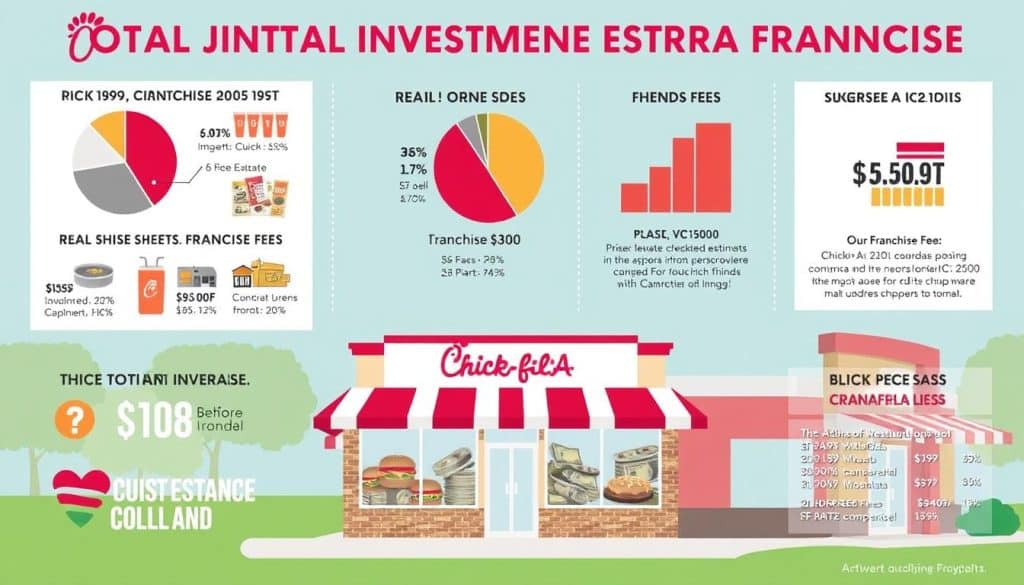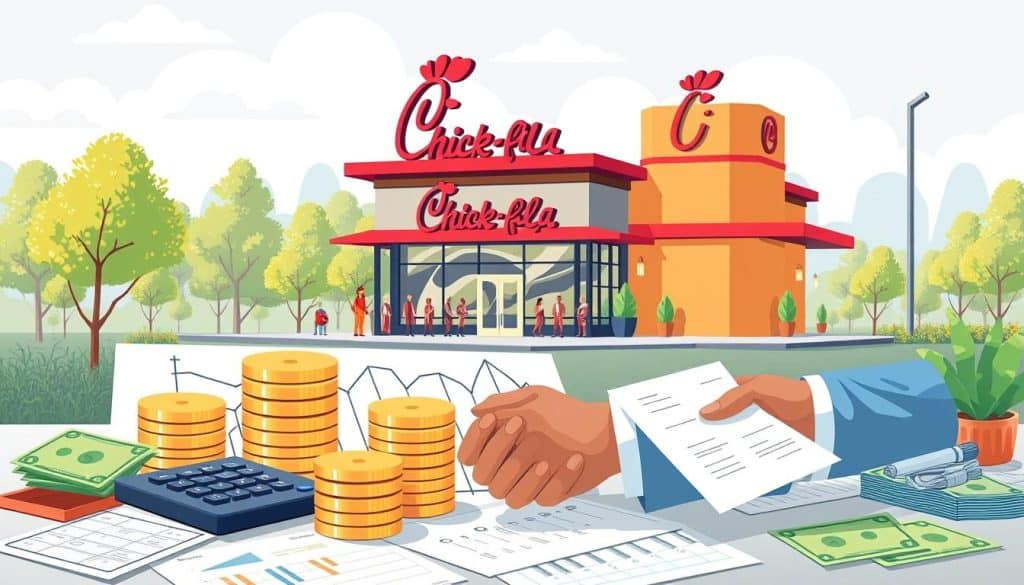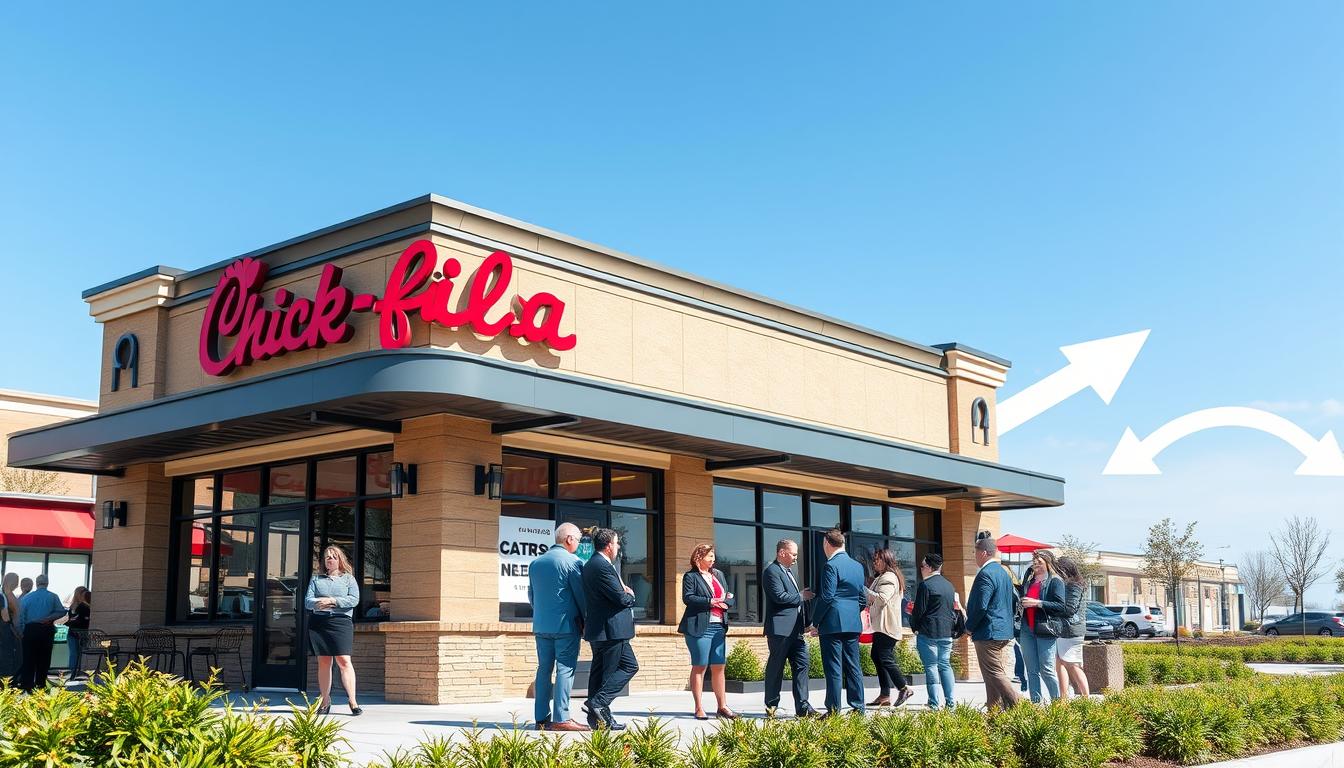Ever thought about how a $10,000 franchise fee could lead to a profitable business in fast food, like Chick-fil-A? Chick-fil-A has made a big impact in the fast-food world, starting in 1967 by S. Truett Cathy. Today, it has over 2,600 locations and is known for its tasty menu and unique franchise model.
This article explores the financial side of owning a Chick-fil-A franchise. We’ll look at the costs, ongoing fees, and the investment needed. This information is key for those interested in starting their own Chick-fil-A franchise.
Key Takeaways
- The initial franchise fee for starting a Chick-fil-A franchise is only $10,000.
- The total investment to launch can range anywhere from $585,500 to $3.33 million.
- Chick-fil-A franchises average about $9.4 million in annual sales, among non-mall locations.
- Chick-fil-A franchises pay a 15% royalty fee on sales and give 50% of net profits.
- Getting a franchise is tough, with less than 1% of applicants accepted.
- Chick-fil-A’s franchise model doesn’t allow selling or transferring ownership.
- Chick-fil-A has a very low franchise failure rate of 2% within three years.
Understanding the Chick-fil-A Franchise Model
The chick fil a franchise model is unique in the quick-service restaurant world. It offers a low initial investment, making it appealing to many. Franchisees handle daily tasks, while Chick-fil-A owns the property. This setup helps keep costs down and ensures a consistent brand experience.
The Basics of the Chick-fil-A Concept
By 2023, Chick-fil-A had over 2,600 locations, making more than $21 billion in revenue. This is more than double what Popeyes and KFC make. The franchise fee is just $10,000, which is much lower than many others.
Even though the cost is low, there are ongoing expenses. These include a 15% royalty on sales and a share of profits before tax. This model shows Chick-fil-A’s dedication to quality and customer satisfaction.
Unique Aspects of the Franchise Structure
Several things make the chick fil a franchise stand out. For example, 96% of operators stay with the franchise, showing they’re happy. Getting a franchise is tough, with less than 1% accepted.
This strict acceptance ensures only the best run the business. The franchise offers strong support and good financial returns. On average, each unit makes about $9.27 million a year.
Initial Franchise Costs
Starting a Chick-fil-A franchise requires understanding the financial side. The costs include several fees and investments. The franchise fee is a key expense, at just $10,000. This fee gives you access to the Chick-fil-A brand, training, and support.
Breakdown of Initial Fees
Looking at chick fil a franchise fees, you’ll see a wide range. The total investment can be from $295,412 to $2,431,608. This range depends on the location and equipment needed. You’ll also have to pay for opening inventory, rental agreements, and other operational costs.
Equipment and Facility Expenses
The costs for equipment and setting up the facility are significant. The location you choose can greatly affect these expenses. You’ll need to budget for leasing or buying equipment and setting up the space. This ensures you’re ready for the financial side of running a Chick-fil-A franchise.
Royalty and Ongoing Fees
Thinking about starting a Chick-fil-A franchise? It’s key to know the ongoing franchise costs. Franchisees pay a 15% royalty on their sales, which is one of the highest in fast food. This chick fil a royalty fee shows Chick-fil-A’s dedication to keeping its brand strong and quality high across all locations.
Understanding the 15% Royalty Fee
The 15% royalty fee is paid every month. It’s a big financial commitment for franchisees. They also give 50% of their profits to the company. This can cut into their earnings. Even with a $10,000 initial fee, ongoing costs can greatly reduce profits. It’s important to plan for these costs over the long term.
Marketing Contribution Costs
Franchisees also pay for marketing to help with national and local ads. These costs are key for promoting the Chick-fil-A brand and boosting sales. It’s vital for those interested in franchising to carefully consider the chick fil a royalty fee and marketing costs. For more information, check out the Franchise Disclosure Document.
Total Investment Estimates
Starting a Chick-fil-A franchise requires a deep look at the total investment. Opening a new Chick-fil-A costs between $295,412 and $2,431,608. These numbers depend on location, restaurant size, and market conditions.
Range of Estimated Startup Costs
Startup costs for Chick fil a can change a lot. The initial fee is just $10,000. But, you’ll also need money for equipment, marketing, and running the business. This adds up to a big financial commitment.
The total investment, as shown in the Franchise Disclosure Document (FDD), can go up to nearly $2.3 million. This is for specific situations.
Variables Affecting Total Investment
Many things can change the total investment. The local economy, real estate costs, and the franchise’s location are big factors. Franchisees need to be ready for extra costs that might require more money.
Knowing these details helps with better financial planning. It’s key for those wanting to start a franchise.

Financial Requirements for Franchisees
Potential franchisees looking to join Chick-fil-A must meet certain chick fil a financial requirements. These ensure they have the financial strength to run a successful business. It’s important to understand these requirements if you’re thinking about investing.
Minimum Net Worth Requirements
The net worth requirements for franchisees to invest in a Chick-fil-A franchise are high. You need at least $1 million in net worth. This shows you can handle the big costs of running a Chick-fil-A restaurant.
Candidates must prove they can meet these financial standards. This shows Chick-fil-A’s commitment to keeping operations stable.
Liquid Capital Requirements
Candidates also need to show they have about $250,000 in liquid assets. This money is key for covering initial costs and ongoing expenses. It helps with staffing, inventory, and more.
Meeting these chick fil a financial requirements helps franchisees face the challenges of the fast-food industry. It prepares them for the costs and responsibilities of running a franchise.
Financing Options for Franchisees
Prospective Chick-fil-A franchisees need to look at different financing options. They must consider both the initial investment and ongoing costs. Traditional loans are a common choice, backed by established banks.
These loans need a lot of paperwork and meet certain criteria. But they can give the money needed to start a franchise.
Traditional Bank Loans
Many choose traditional loans for franchises. They might get good interest rates and terms. Banks check your credit, business plan, and collateral before saying yes.
The good terms help new franchisees get the money they need. This includes both the initial investment and costs for the first years. While these loans need careful planning, they are a strong base for starting a Chick-fil-A franchise.
Alternative Financing Solutions
There are also alternative financing options. These include grants or partnerships with investors. They offer more flexibility than traditional loans.
These options focus on shared success, not just paying back the loan. Franchisees can use them to get the funds they need for a Chick-fil-A franchise. This way, they can reduce financial risk.

Profitability of a Chick-fil-A Franchise
The chick fil a franchise is very profitable, with high annual revenues. On average, a chick fil a franchise makes about $9 million a year. Standalone locations do even better, with median sales of $9,274,890 in 2023.
This shows a 7% increase from the year before. Chick-fil-A is a top player in the fast-food world.
Average Annual Revenue Analysis
Chick-fil-A’s franchise fee is just $10,000, making it easy to get into. Yet, over 50,000 people apply every year, and only a few get in. This shows how popular and profitable Chick-fil-A is.
Stand-alone units make about $8,500,000 on average. This proves Chick-fil-A’s success and efficient ways of making money.
Factors Influencing Profitability
Several things affect how much money a chick fil a franchise makes. The company takes 50% of profits, which helps it earn more. But, franchisees also have to pay for labor, supplies, and royalties (15% of sales).
Those who manage their costs well can make around $1.2 million a year. Plus, Chick-fil-A has a low failure rate, under 5%. This means most franchises do well.
Chick-fil-A’s profit margin is about 30%. This shows it’s a strong player in the market.
Support Provided to Franchise Owners
Chick-fil-A franchise owners get a lot of help to make sure they do well. They get training that teaches them how to manage and run their places well. This training lasts for weeks and covers leadership, customer service, and how to run a Chick-fil-A.
Training and Ongoing Education Programs
Chick-fil-A really focuses on helping its franchisees. New owners get a lot of training to learn how to run their places and follow the company’s values. They also keep learning new things to make customers happy.
Marketing and Operational Support
Chick-fil-A gives a lot of help with marketing and running the business. Franchisees get help with local ads and national campaigns. This support helps them market well and keep operations high, which helps the brand grow.
Pros and Cons of Investing in Chick-fil-A
Investing in a Chick-fil-A franchise comes with both benefits and drawbacks. It’s important for those interested to weigh the pros and cons. With over 2,600 locations in the U.S., Chick-fil-A has a strong presence, making it a good choice for starting a business.
Advantages of Operating a Chick-fil-A Franchise
The initial investment in a Chick-fil-A franchise is just $10,000. This is much lower than many other franchises. Chick-fil-A also covers all setup costs, making it easier to start.
The company has seen a 16% annual growth rate, opening over 200 new locations each year. This growth means good revenue opportunities for owners. Chick-fil-A is also the favorite restaurant brand in the U.S. for nine years running, making it more marketable.
Chick-fil-A’s business model focuses on full-time operator management. This encourages owners to be involved in daily operations and build community connections. In 2023, franchisees can expect to make around $9,274,890 in gross sales, promising good income.
Challenges and Considerations
While Chick-fil-A offers many benefits, there are also challenges to consider. The ongoing fees for operating a Chick-fil-A location are relatively high. The base service fee is a percentage of gross sales and net profit, which is higher than average for other franchises. This can affect the overall profitability of the investment.
Franchisees must be owner-operators, which requires a lot of time and energy. This can be challenging, even for those who have run businesses before. It’s important to consider these challenges when deciding if investing in Chick-fil-A is right for you.
Franchise Approval Process
Getting a Chick-fil-A franchise is tough. The application process is strict, with only a small number of people getting in. They look for people who are financially stable and share the franchise’s values.
Steps to Apply for a Chick-fil-A Franchise
The first step is to fill out an online application. You’ll need to share your financial info and background. Then, you’ll have interviews and tests to show you’re a good fit.
If you pass, you’ll talk about the franchise agreement and how much it costs. This shows you’re serious about following Chick-fil-A’s rules.
Timeline for Approval
The time it takes to get approved can vary a lot. Some might get a yes fast, while others wait longer. It depends on how many people are applying and how well they match the franchise’s needs.
Being patient is key. The detailed process makes sure only the best people get to run a Chick-fil-A franchise.
Conclusion on Chick-fil-A Franchise Cost
Investing in a Chick-fil-A franchise is an interesting option. It has a low initial cost and can make a lot of money. You only need $10,000 to start, and you could make over $9 million a year. This is a big jump from before.
This shows Chick-fil-A is a good financial choice. It also has a very low failure rate of 2%. This makes it a strong choice in the fast-food world.
But, running a Chick-fil-A is not easy. You have to follow the brand’s rules closely. This means you have to match their standards and values.
Also, not many people get to be a franchise owner. Chick-fil-A only accepts about 1% of applicants. And, you’ll have to pay a royalty fee every year.
So, if you want to invest in Chick-fil-A, you need to plan your finances well. You also need to be ready to work hard to succeed in the long run.
FAQ
What is the initial cost to open a Chick-fil-A franchise?
What are the ongoing fees for Chick-fil-A franchisees?
What financial requirements must franchisees meet?
FAQ
What is the initial cost to open a Chick-fil-A franchise?
The initial fee to open a Chick-fil-A is ,000. But, the total cost to start can be much higher. It ranges from 5,412 to ,431,608, depending on several factors.
What are the ongoing fees for Chick-fil-A franchisees?
Franchisees pay a 15% royalty fee on their sales. They also share 50% of profits. Plus, there are marketing and operational costs.
What financial requirements must franchisees meet?
The exact financial needs are not public. But, having at least
FAQ
What is the initial cost to open a Chick-fil-A franchise?
The initial fee to open a Chick-fil-A is $10,000. But, the total cost to start can be much higher. It ranges from $295,412 to $2,431,608, depending on several factors.
What are the ongoing fees for Chick-fil-A franchisees?
Franchisees pay a 15% royalty fee on their sales. They also share 50% of profits. Plus, there are marketing and operational costs.
What financial requirements must franchisees meet?
The exact financial needs are not public. But, having at least $1 million in net worth and $250,000 in liquid assets is recommended. This helps cover operational costs.
How competitive is the Chick-fil-A franchise approval process?
The approval process is very competitive, with less than 1% acceptance. Candidates must go through many interviews and show strong financial stability.
What kind of support does Chick-fil-A provide to franchisees?
Chick-fil-A offers a lot of support. This includes training on leadership, operational excellence, and marketing. It helps franchisees run their businesses well.
How profitable is a Chick-fil-A franchise?
Chick-fil-A franchises can be very profitable. Standalone locations make around $9 million a year. But, net earnings can vary due to costs and fees.
What financing options are available for prospective franchisees?
Franchisees can look into bank loans or alternative financing. This includes grants and investor partnerships. These options help manage the initial and ongoing costs.
What unique aspects define the Chick-fil-A franchise model?
The Chick-fil-A model is unique. The company owns the premises, while franchisees run the restaurant. This ensures quality and consistency across all locations.
What are the pros and cons of owning a Chick-fil-A franchise?
The advantages include a low initial investment and strong brand recognition. But, there are high ongoing fees and no ownership in business equity. Prospective franchisees should weigh these against their goals.
How do the setup costs for Chick-fil-A franchises vary?
Setup costs for Chick-fil-A franchises vary a lot. They depend on location, restaurant size, and local market conditions. A detailed analysis is key for financial planning.
million in net worth and 0,000 in liquid assets is recommended. This helps cover operational costs.
How competitive is the Chick-fil-A franchise approval process?
The approval process is very competitive, with less than 1% acceptance. Candidates must go through many interviews and show strong financial stability.
What kind of support does Chick-fil-A provide to franchisees?
Chick-fil-A offers a lot of support. This includes training on leadership, operational excellence, and marketing. It helps franchisees run their businesses well.
How profitable is a Chick-fil-A franchise?
Chick-fil-A franchises can be very profitable. Standalone locations make around million a year. But, net earnings can vary due to costs and fees.
What financing options are available for prospective franchisees?
Franchisees can look into bank loans or alternative financing. This includes grants and investor partnerships. These options help manage the initial and ongoing costs.
What unique aspects define the Chick-fil-A franchise model?
The Chick-fil-A model is unique. The company owns the premises, while franchisees run the restaurant. This ensures quality and consistency across all locations.
What are the pros and cons of owning a Chick-fil-A franchise?
The advantages include a low initial investment and strong brand recognition. But, there are high ongoing fees and no ownership in business equity. Prospective franchisees should weigh these against their goals.
How do the setup costs for Chick-fil-A franchises vary?
Setup costs for Chick-fil-A franchises vary a lot. They depend on location, restaurant size, and local market conditions. A detailed analysis is key for financial planning.





